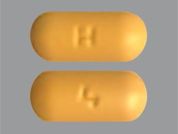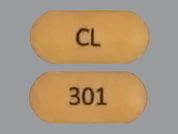Efavirenz
Efavirenz
What is Efavirenz used for?
This drug is used with other HIV medications to help control HIV infection. It helps to decrease the amount of HIV in your body so your immune system can work better. This lowers your chance of getting HIV complications (such as new infections, cancer) and improves your quality of life. Efavirenz belongs to a class of drugs known as non-nucleoside reverse transcriptase inhibitors (NNRTIs). Efavirenz is not a cure for HIV infection. To decrease your risk of spreading HIV disease to others, continue to take all HIV medications exactly as prescribed by your doctor. Use an effective barrier method (latex or polyurethane condoms/dental dams) during sexual activity as directed by your doctor. Do not share personal items (such as needles/syringes, toothbrushes, and razors) that may have contacted blood or other body fluids. Consult your doctor or pharmacist for more details.
CHEMICAL NAME
DRUG TYPE
HivEfavirenz Prices
Searching for the lowest prices
What does Efavirenz look like?
View all Efavirenz Image Information (2)Efavirenz Frequently Asked Questions
Drug interactions may change how your medications work or increase your risk for serious side effects. This document does not contain all possible drug interactions. Keep a list of all the products you use (including prescription/nonprescription drugs and herbal products) and share it with your doctor and pharmacist. Do not start, stop, or change the dosage of any medicines without your doctor's approval.
A product that may interact with this drug is: orlistat.
Do not take this medication with other products that contain efavirenz unless specifically directed by your doctor.
Other medications can affect the removal of efavirenz from your body, which may affect how efavirenz works. Examples include some drugs used to treat seizures (such as carbamazepine, phenobarbital, phenytoin), among others.
Efavirenz can speed up the removal of many other medications from your body, which may affect how they work. Examples of affected drugs include atovaquone/proguanil, azole antifungals (such as itraconazole, ketoconazole), bedaquiline, cobicistat, elbasvir/grazoprevir, macrolide antibiotics (such as clarithromycin), methadone, rifabutin, sertraline, some cholesterol-lowering statins (such as atorvastatin, pravastatin, simvastatin), warfarin, among others.
Some other drugs to treat HIV infection (such as elvitegravir, other NNRTIs including etravirine/nevirapine/rilpivirine) may also interact with efavirenz. If you are taking atazanavir with this medication, you may need to also take another medication (ritonavir). Consult your doctor or pharmacist for more details.
This medication may decrease the effectiveness of hormonal birth control such as pills, patch, or ring. This could cause pregnancy. Discuss with your doctor or pharmacist if you should use reliable backup birth control methods while using this medication. Also tell your doctor if you have any new spotting or breakthrough bleeding, because these may be signs that your birth control is not working well.
Tell your doctor or pharmacist if you are taking other products that cause drowsiness including alcohol, marijuana (cannabis), antihistamines (such as cetirizine, diphenhydramine), drugs for sleep or anxiety (such as diazepam, zolpidem), muscle relaxants, and opioid pain relievers (such as codeine).
Check the labels on all your medicines (such as allergy or cough-and-cold products) because they may contain ingredients that cause drowsiness. Ask your pharmacist about using those products safely.
This medication may interfere with certain lab tests (such as urine cannabinoid tests), possibly causing false test results. Make sure lab personnel and all your doctors know you use this drug.
IMPORTANT: HOW TO USE THIS INFORMATION: This is a summary and does NOT have all possible information about this product. This information does not assure that this product is safe, effective, or appropriate for you. This information is not individual medical advice and does not substitute for the advice of your health care professional. Always ask your health care professional for complete information about this product and your specific health needs.

